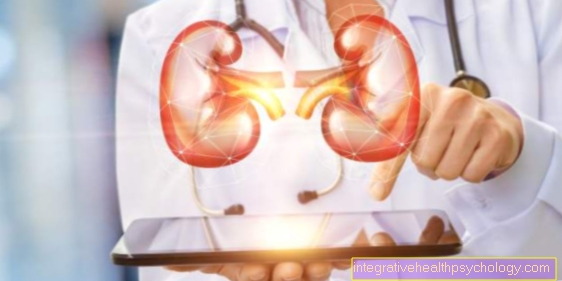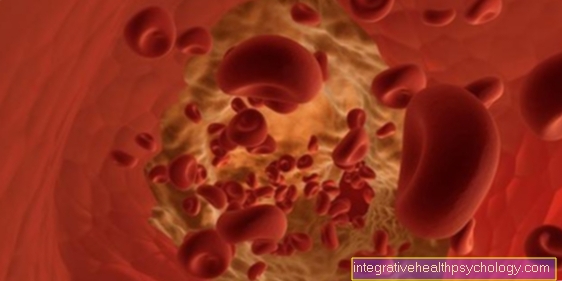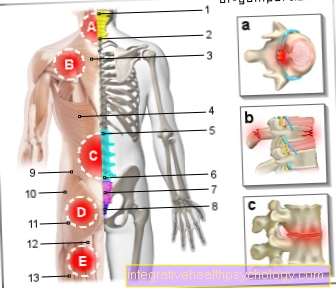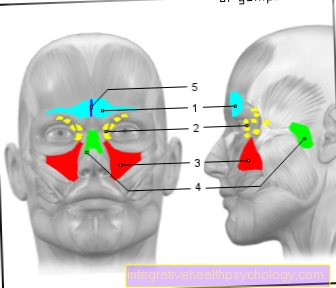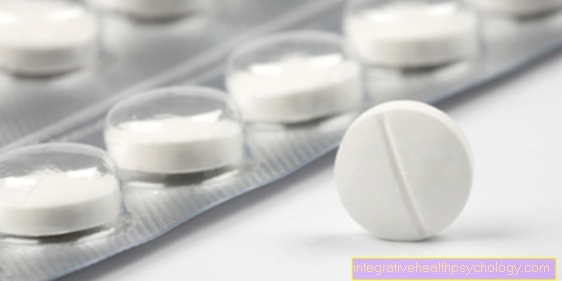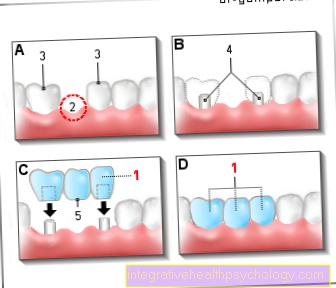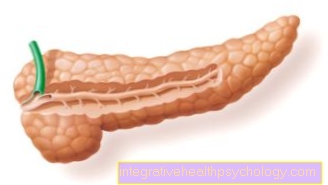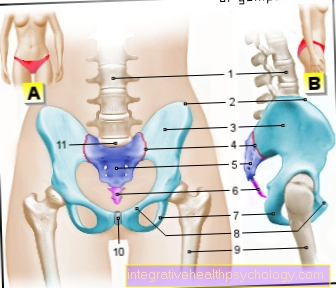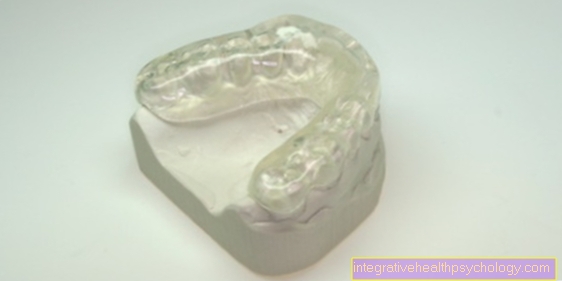Flatulence
Synonyms
Intestinal winds
Medical: Flatulence
English: flatulence
introduction
Having gas, too flatulence called, is an excessive accumulation of air or gases in the digestive tract. Complaints caused by gas or a hasty meal are harmless and easy to treat. One speaks of meteorism when the stomach is bloated and bulged ("bloated stomach").
Read more on the topic: Bloated stomach

In flatulence, the actual wind, an excessive amount of intestinal gases go out through the anus. Sometimes, however, flatulence can also be a symptom of a serious illness, in which case the doctor should be consulted. Basically, it is quite normal for small amounts of gases to form in the intestine.
They are formed by the neutralization of gastric acid and by the activity of beneficial bacteria in the large intestine, and they escape naturally without causing discomfort. About 40 percent of Germans suffer from these and other gastrointestinal problems at times. Flatulence occurs, among other things, from the consumption of flatulent foods (e.g. cabbage, beans), from unhealthy eating habits and intolerances (e.g. lactose intolerance, gluten intolerance) and from stress and hectic pace. Flatulence can also occur as a side effect of various drugs or as a side effect of various diseases.
causes
The possible causes of flatulence are many.
Usually they have harmless causes.
Flatulence is excess gas that is formed in the intestines and eventually goes away in the form of flatulence. A common cause of this is that nutrition.
Some foods lead to gas, for example legumes and Cabbage. Also whole grain products promote the development of intestinal gases.
Read more about the topic here Bloated stomach after eating
In addition, the Bacterial flora of the intestine significantly involved in the formation of the gases.
In the metabolic process of bacteria these gases are created and then become noticeable through flatulence. At frequent consumption of sweets flatulence can occur more often, as bacteria preferentially metabolize sugary foods and accordingly then produce more gases.
The Intestinal flora is in a delicate equilibrium, which can get out of balance. A common cause of this are Antibiotic therapies. This can lead to a relocation of the intestine with it Mushrooms or certain Bacterial species come.
The imbalance of the intestinal flora can then manifest itself as flatulence.
(Read more on the topic Abdominal pain from antibiotics)
However, some of the intestinal binders also get through swallowed air which reaches the gastrointestinal tract when speaking, eating and drinking and then migrates through it. A lot of air is often swallowed, especially when eating hectically. Finally, bloating can also be due to various Food intolerance to be triggered. The flatulence is then usually very pronounced and occurs in direct connection with food intake.
At the Leaving out the triggering foods the flatulence also goes back quickly. One of the most common food intolerances is Lactose intolerance - the milk protein intolerance. Also Intolerance to gluten and Fructose can occur. Psychological factors also play a role in digestion. Therefore you can psychological stress, To care and Stress factors also express through flatulence.
Also during pregnancy many women sometimes complain of flatulence.
Rarer causes for gas are for example a Irritable bowel syndrome, Liver diseases or pancreas, one chronic inflammatory bowel disease or Colon cancer. With these diseases, however, there are usually other symptoms that are more in focus than the flatulence itself.
Symptoms
The primary way air leaves the body is that Exhale. The gases pass through the intestinal wall into the blood and finally into the Lungswhere they leave the body again with the breath. If the amount of gases in the intestine becomes too large, larger gas bubbles form that can no longer be breathed out. Foaming occurs. There are two ways for the gas bubbles collected in the abdominal cavity to escape from the body: "upwards" by burping ("burping") or "downwards" by flatulence (medical: flatulence).
The excessive air in the abdomen can trigger further discomfort. These include a feeling of fullness and pain on pressure (flatulence) in the stomach and intestines bloated stomach, nausea and bowel sounds.
Basically, the patient has the need to deflate in order to maintain the appropriate overpressure in the Intestines to reduce. The level of distress associated with flatulence can vary. It is particularly pronounced when the flatulence is accompanied by severe pain. For those affected who are in public because of their job or who regularly take part in meetings in their everyday work or who have frequent customer contacts, flatulence can also cause a strong feeling of shame.
But flatulence can also be a stressful problem in private surroundings. Sometimes bloating requires treatment.
Some have flatulence foul to smelly smell. This is normal as the intestinal gases are passed through an area of the intestine that is riddled with bacteria. However, if the intestinal gases are excruciatingly strong, it must also be examined whether it is not the cause of the flatulence Fungal attack could act.
Pain
There is too much in flatulence Air in the gastrointestinal area, which unnaturally dilates the digestive tract and thus causes discomfort.Since the intestine is supplied with nerves, excessive stretching of the intestinal wall triggers a moderate to severe one Abdominal pain with flatulence that lasts until the air has broken down or escapes.
The Pain mostly have a pulling, tearing character. If the air cannot escape, cramp-like pain in the intestinal area can also occur.
The pain that is triggered by flatulence can also be felt in the Upper abdomen (Upper abdominal pain and gas) and be so severe that the general condition of the patient worsens.
Gas and diarrhea
In addition to flatulence, it also occurs diarrhea, two diseases are shortlisted as the cause. First the Lactose intolerance or the Gluten intolerance, on the other hand also one infectious disease, like the so-called gastroenteritis. Also some chronic inflammatory diseases, like that Ulcerative colitis or the Crohn's disease can be the cause of flatulence symptoms with diarrhea.
Here, too, an accurate diagnosis should be carried out as soon as possible if the symptoms do not go away within 14 days.
diagnosis

To at Flatulence (flatulence) To make the diagnosis, the doctor first informs himself about possible medication taken, previous illnesses and accompanying complaints, as well as about the nutrition and lifestyle habits. This is followed by a thorough physical examination, during which the doctor palpates the abdomen, taps it and listens with the stethoscope. The doctor may feel the rectum with his finger (so-called rectal exam).
Depending on the results of the previous examinations and the suspected cause, further examinations may be part of the diagnosis of flatulence. These include, among other things Ultrasonic (Sonography) of the abdomen, roentgen, Blood tests, urine and stool tests as well as tests for food intolerance (e.g. lactose tolerance test, see Lactose intolerance). It may be necessary to have a Gastroscopy and / or a Colonoscopy with removal of small amounts of tissue (biopsy). Imaging procedures like that too Computed Tomography- or Magnetic resonance imaging or an ERCP (representation of the biliary and pancreatic ducts) can help in finding the cause. As a rule, such an elaborate diagnosis is not necessary for flatulence. Often a test for a food intolerance already gives sufficient information about the cause of the symptoms and the doctor can dispense with further examinations.
When do you have to see a doctor with flatulence?
Evidence of serious Gastrointestinal diseases are common VomitVomiting blood, blood in your stool, unwanted weight loss, fever and foul smelling, bulky stool.
therapy
As medication of flatulence, there are numerous substances that bind the excessive air in the intestine and thus lead to a reduced pressure in the intestine. Lots of these Medication to have herbal ingredients.
Substances such as Lefax® or Sab Simplex®that should be taken several times throughout the day (usually with a meal). However, this treatment is one purely symptomatic treatment. It does not address the cause and if it is an intolerance, the gas will most likely come back when the drug is stopped. Is it a Lactose intolerance can still be tried by taking the missing enzyme Lactase alleviate the discomfort. This preparation should be taken before meals. It puts no long-term treatment an intolerance and can be consistent change in diet Replace insufficiently.
Probably the most important Home remedies to treat the gas Caraway seed. There are numerous caraway seed preparations in the form of teas, capsules or drops that can be taken in case of complaints. Caraway seeds can also be taken pure. To do this, sprinkle a teaspoon completely with caraway seeds in the event of complaints and then take them into the mouth and washes them down with water. An effect should take place after approx. 10-30 minutes. Also fennel is a substance that can help prevent gas formation in the Intestines to reduce. Mostly in the form of teas or drops they are available for treatment. Many combinations of fennel and caraway are also available in pharmacies and health food stores and can help.
Flatulence often goes along with it constipation (Constipation). There can also be a cause here chronic dehydration be. For this reason, you should control the amount you drink daily and increase it if necessary. The desired amount of drinking per day is approx. 2-3 liters.
Because flatulence also often through Minor movement come about, care should be taken that those affected move sufficiently and play sports. Flatulent foods such as Beans, cabbage or onions should be reduced and if they do, anti-inflating drugs should be taken beforehand. The diet should balanced and rich in fiber and are kept low in fibers.
You can also find more information under our topic: Drugs for flatulence.
Anti-flatulence drugs
There are some drugs that are either one Prevent increased intestinal gas formation or to reduce them. Physically, the air in the intestine is created by a barrier between the chyme and the intestinal wall. This barrier that made smallest gas bubbles prevents the nutrients from being drawn out of the food and also prevents the air from being absorbed by the intestinal wall. During the digestive process by the bacteria present in the intestine, a not inconsiderable amount of air is created, which then remains in the intestine and inflates it.
The Anti-flatulence drugs disrupt this barrier in the intestinal wall and dissolve these small vesicles, which means that the air in the intestine can diffuse through the intestinal wall. Sab Simplex® are available as drops and Lefax® as chewable tablets.
Both drugs work in this vesicle-dissolving way through the ingredient dimethicone. Sab Simplex® is often used in small children who are often affected by flatulence.
Lefax® are mostly taken by adults. Lefax® should be taken with every meal if you have symptoms. At uncontrollable flatulence but should not be forgotten even after the triggering Look for cause.
Home remedies for flatulence
Lots Home remedies work just as well as real drugs, but usually have their disadvantage in their short duration of action.
It has long been known that Caraway seed has a flatulence-relieving effect. In the case of severe flatulence, a level teaspoon of pure caraway seeds should be put in your mouth and swallowed with water. The air-binding effect occurs after a few minutes, but usually only lasts for about 20-30 minutes.
anise and fennel are also home remedies that have a gas-reducing effect on the body. They are mostly taken as a tea. Often there is also Combination preparations, which consist of both anise, fennel and caraway and which go under the name Gastrointestinal tea or the like. Also ginger an air-binding effect in the intestine is ascribed.
In the case of a high-fat diet, a few spices that avoid flatulence should always be added to the dish. E.g. can dill seeds, coriander and garlic avoid the development of flatulence and should be used especially with very heavy food. In addition to the air-reducing treatment, the development of flatulence should always be prevented at an early stage.
So should be on a Drinking amount of approx. 2 liters to be respected on the day.
Long periods of sedentary activity can also lead to flatulence. Regular exercise and sport should be carried out not least because of improved digestion and a lower risk of flatulence.
Furthermore, flatulence can also arise because too a lot of air in the gastrointestinal area during food intake transgresses. For this reason it is as important as possible to eat slowly and chew at least 30 times before swallowing the bite.
Other home remedies for flatulence are mechanical in nature. So can a Abdominal massage help to break down the air in the intestine faster. The massage should be performed lying on your back and using circular movements. You can also try to relieve the pain caused by flatulence by placing a Hot water bottle to treat. However, since the heat can also cause air to spread in the intestine, the pain in the intestine may initially intensify. In the event of severe deterioration, the use of a hot water bottle should be avoided.
Irritable stomach: discomfort without cause
Flatulence, bloating and other dyspeptic complaints are widespread among residents of industrialized nations. Many of those affected suffer from it even with normal food intake and usually without any detectable organic cause. Why this is so and why more and more people are facing the problem "Irritable stomach"(also called functional dyspepsia) remains unexplained.
Read more on the topic Irritable stomach
Flatulence in pregnancy
Flatulence in pregnancy are completely normal.
The main reason in the beginning is not food intolerance, but Changes in the hormonal balance.
The hormone progesterone is increasingly released during the first few months of pregnancy. This affects them Muscles of the intestine and allows the corresponding intestinal passages to proceed more slowly. This can lead to flatulence and discomfort.
It also occurs as the pregnancy progresses and the child grows Changes in pressure conditions in the abdominal area. Of the uterus can sometimes become so large that it lies on the intestines and causes excessive pressure. This too can lead to flatulence and intestinal discomfort. For treatment one uses the same means as for flatulence outside of the pregnancy.
Please also read our topic: Home remedies for flatulence
When occurring, the conventional Teas With Caraway seed, fennel or Anise addition be used. Also the Heat application can help alleviate the symptoms. A cherry stone pillow or a hot water bottle can lead to the necessary relaxation of the intestinal muscles. Furthermore, the person concerned can through circular stroking try to distribute the excess air in the area of the abdomen via the abdomen. In many cases, repeating this exercise regularly will provide relief.
Also Schüssler salts can be used for flatulence during pregnancy without any problems. So should the fabrics Ferrum Phosphoricum, Magnesium Phosphoricum and Silicea be taken at regular intervals. Many pregnant women with flatulence give an improvement after the Ingestion of wheat bran on. Especially known as a source of fiber, regular consumption can lead to a quick effect. That is also important adequate hydration and the physical movement of those affected. The combination of drinking little and resting can worsen the symptoms.
Flatulence in infants
Many infants suffer from flatulence, known as "three-month colic", in the first three months of life. The digestive tract is still immature in this phase of life and problems arise during adjustment. Before the birth, the child was supplied by the maternal circulation, but now the intestine has to start its work. In addition, the little ones often swallow a lot of air while drinking. In rare cases, intolerance such as lactose intolerance already occurs at this age.
The contact of air and milk in the baby's belly creates a tough, fine-bubble foam. The gas bubbles travel to the intestines, where they press on the intestinal wall and cause pain. These abdominal pain are not infrequently accompanied by a bulging stomach and violent screaming attacks that last for hours. This is very worrying for the parents.
Rather, care should be taken when treating flatulence. It is important to prevent flatulence as successfully as possible. This can be achieved by reducing all of the air in the gastrointestinal area. After each meal the infant should be encouraged to vent the stomach through the mouth. This is often achieved with a slight flap on the back. With this maneuver you can prevent the actual flatulence from developing. If flatulence has already occurred, one should use the abdominal massage and massage the child's stomach in the direction of digestion in order to better distribute the excess air.
In the case of severe flatulence, the use of caraway seeds and anise can also be helpful. If this does not help, Lefax treatment or heat treatment can be attempted.
You might also be interested in: Flatulence while breastfeeding
useful information
in the Digestive tract In the course of a day, around 14 liters of gas are formed, mainly carbon dioxide, which is produced in the intestine when acidic gastric juice is neutralized. The gases are constantly being carried away from the intestine, the majority of which passes into the blood and is exhaled through the lungs.
99 percent of the gases are odorless.





